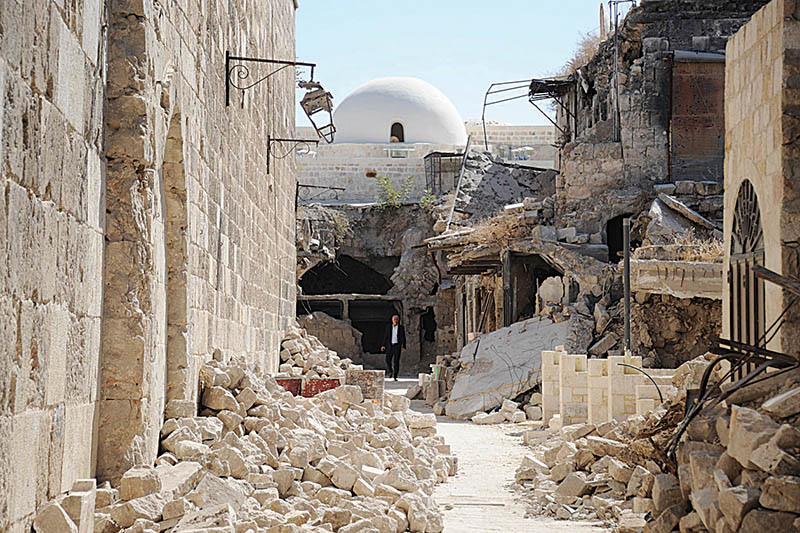
UNITED NATIONS:
The head of the Arab League exchanged a warm handshake Friday at the United
Nations with the foreign minister of Syria, which has been suspended from the
body since 2011. The exchange between Ahmed Aboul Gheit, the secretary general
of the Arab League, and Foreign Minister Walid Muallem appeared to be brief and
impromptu during the annual UN General Assembly. In a video posted on Twitter
by a journalist for Abu Dhabi newspaper The National, Aboul Gheit walks in a
hallway at the UN headquarters and sees Muallem, who turns around. "Good
evening. Great. How are you?" Aboul Gheit says, before shaking Muallem's
hand and kissing him on both cheeks.
The Arab League
chief, who is Egyptian, then exchanges greetings with Syria's Deputy Foreign
Minister Faisal Mekdad and its ambassador to the United Nations, Bashar
Jaafari. "Really, it's always a pleasure to see you," Aboul Gheit
says to the Syrian officials before giving a friendly tap on the shoulder.
Syria was suspended from the Arab League in 2011 with the outbreak of unrest
ruthlessly crushed by President Bashar Al-Assad. The war has killed more than
370,000 people and displaced millions, but both Arab and Western officials have
gradually come to accept that Assad will succeed in maintaining power.
Chemical weapons
In another
development, the United States vowed a response as it said it had confirmed
another chemical weapons attack by Syrian President Bashar al-Assad's forces, although
there were no fatalities. The Assad regime used chlorine on May 19 in Latakia
province during its ferocious offensive to take back the last major rebel
stronghold in nearby Idlib, Secretary of State Mike Pompeo said. "The
United States will not allow these attacks to go unchallenged nor will we
tolerate those who choose to conceal these atrocities," Pompeo told
reporters in New York, where he was taking part in the UN General Assembly.
"The United
States will continue to pressure the insidious Assad regime to end the violence
directed at Syrian civilians and participate in the UN-led political
process," he said. He later took part in a meeting on Syria with his
counterparts from France, Germany, Saudi Arabia, Jordan and Egypt, who said in a
joint statement: "The use of any chemical weapons in Syria shall not be
tolerated."
Four people were
injured in the attack and, while there were no deaths, it marked the first
known chemical attack in a year and raised fears of further use, said Jim
Jeffrey, the US special representative for Syria. "We fear that the
regime, which has very weak infantry forces, will try to use chemical weapons
once again to make up for its inability to seize ground by combat power,"
Jeffrey told reporters.
No independent verification
was available of the attack from northwestern Syria, where rights observers say
that more than 1,000 people have been killed and 400,000 displaced since the
government began its bombardment in April. The United States and France had
both earlier aired suspicions of a chemical attack but had held off on making a
formal determination, saying more research was needed.
Pattern of
chemical use
International
investigators say Assad has repeatedly used chemical weapons against civilian
targets in his brutal quest to win the civil war, in which more than 370,000
people have died. Former president Barack Obama had called chemical weapons use
a red line but ultimately declined military retaliation. Drawing a contrast,
President Donald Trump ordered strikes with 59 cruise missiles in response to a
sarin gas attack in April 2017 in the rebel-held Idlib town of Khan Sheikhun.
The reprisal
evidently did not deter Assad, who enjoys strong support from Russia, which has
vetoed UN Security Council bids to rein in Assad and deployed its military to
Syria. Jeffrey believed Russian officers were aware of the chemical attack,
saying: "It's very hard for me to believe that professionals as good as
that, the way they are spread out, would not know of something like this."
Weighing response
The United States
announced one countermeasure on Thursday, slapping sanctions on a Russian
network of three individuals and five vessels for supplying fuel to Russian
forces in Syria. Pompeo said that the United States was donating an additional
$4.5 million to the Organization for the Prohibition of Chemical Weapons, the
Hague-based body that monitors the international treaty banning such arms.
But Pompeo
appeared to downplay the prospect of military action, noting that the attack
involved chlorine, which affects the respiratory system. The Khan Sheikhun
attacks, which the United Nations said killed 83 people, entailed sarin, an
ultra-potent gas that devastates the nervous system. "So it's a bit of a
different situation," Pompeo said.
But he warned:
"The Syrian regime should know and the world should appreciate the fact
that we're going to do everything we can reasonably do to prevent this kind of
thing from happening again." The US finding on chemical weapons came in a
week that offered one glimmer of hope, with the United Nations announcing the
formation of a committee to write a new Syrian constitution. The group will
involve both the government and opposition, although there is no consensus on
which direction they will take the constitution.- Agencies









